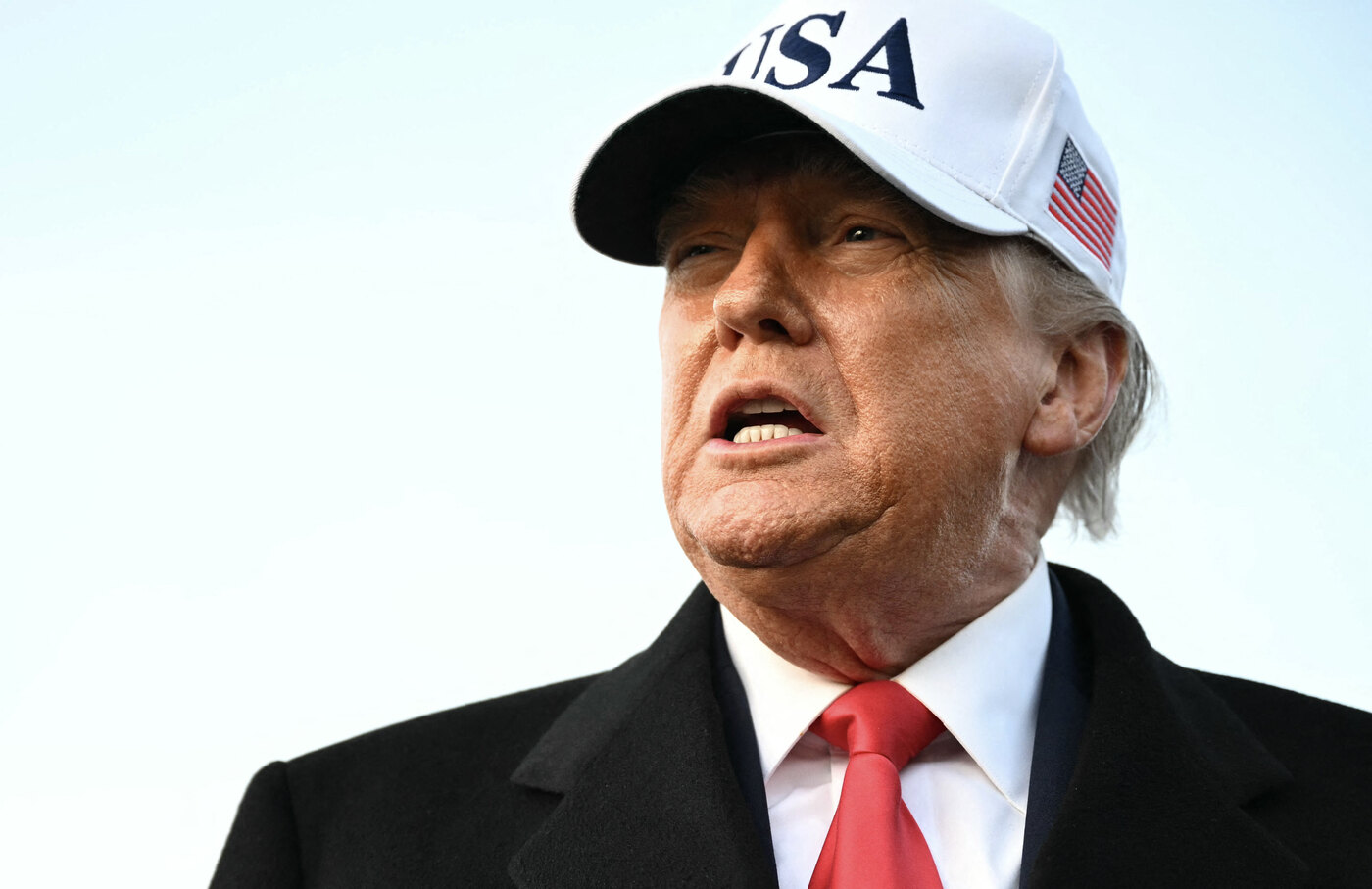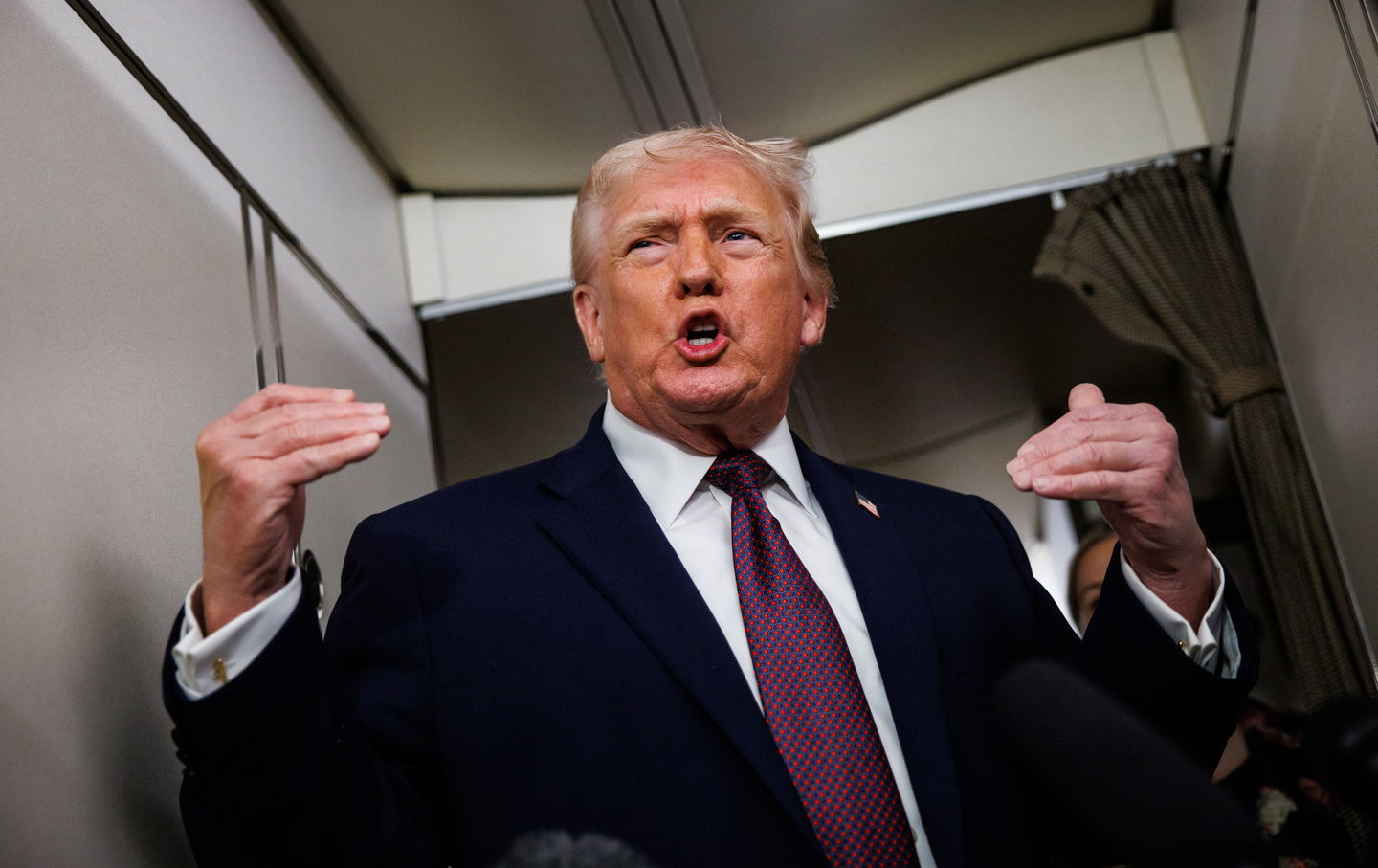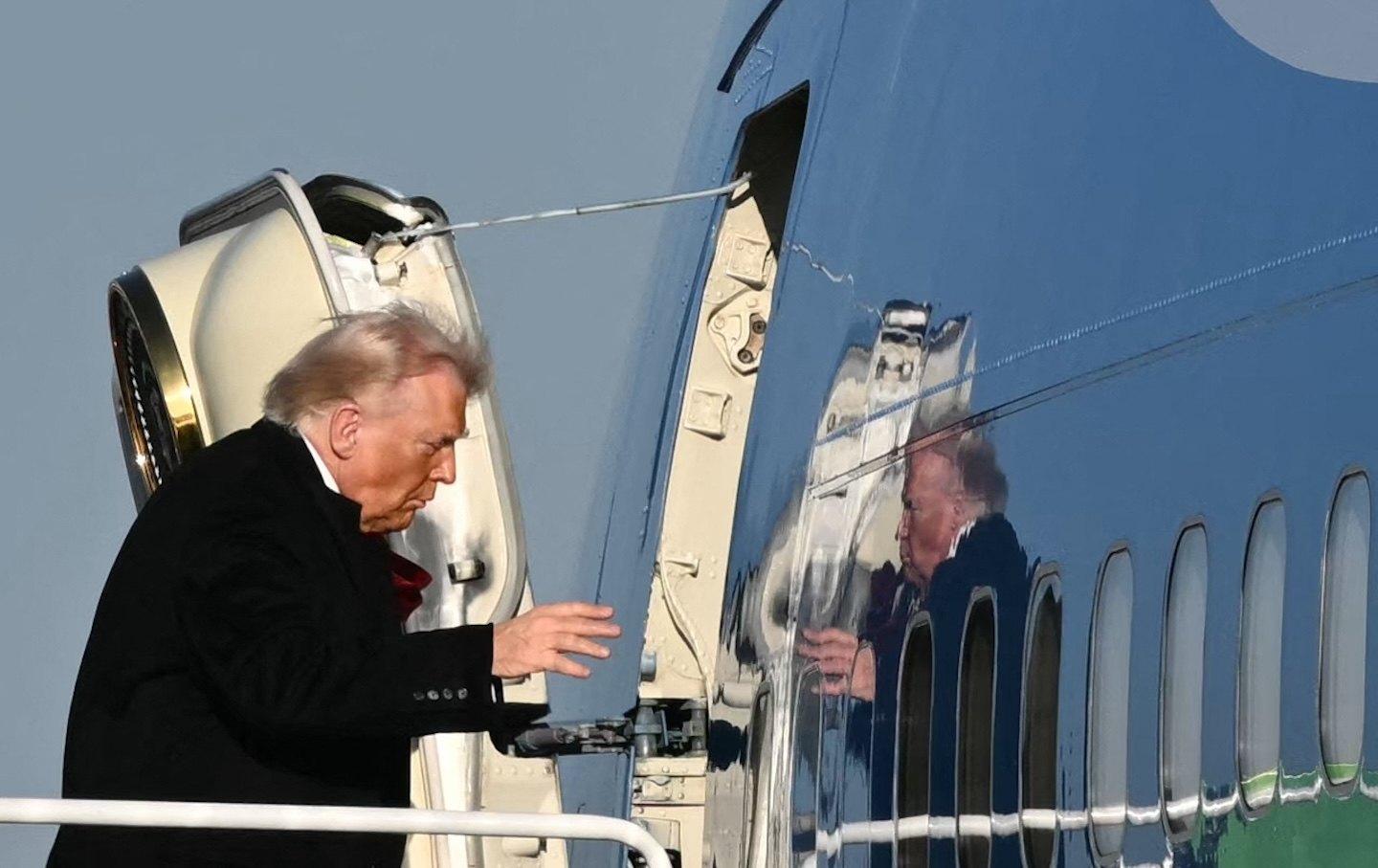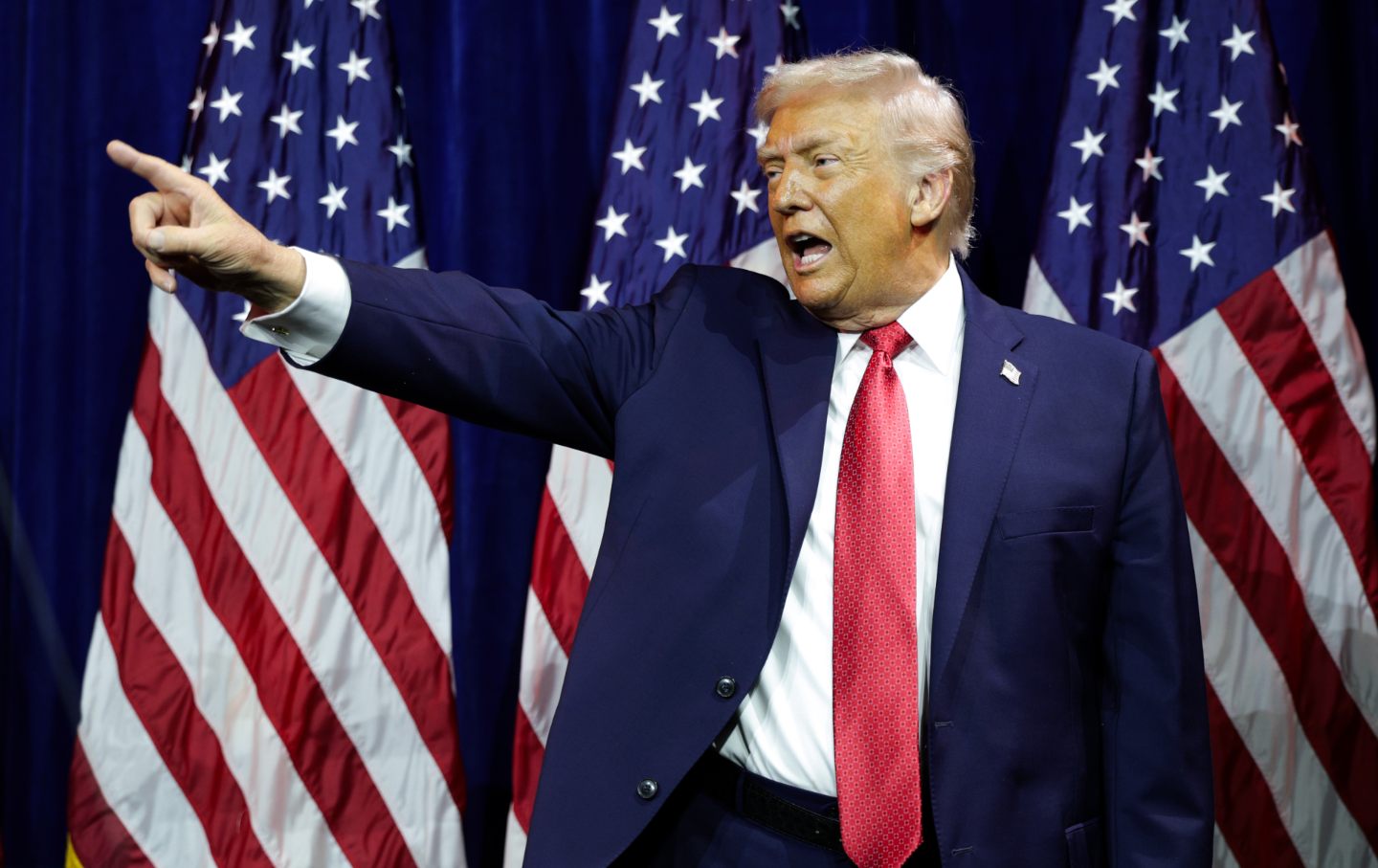The Courts v. Trump and Musk
On this episode of Start Making Sense, David Cole and Robert Weissman on Trump’s current losing streak in federal court.

Here's where to find podcasts from The Nation. Political talk without the boring parts, featuring the writers, activists and artists who shape the news, from a progressive perspective.
Trump has lost a series of major legal battles in the last week, where courts have ruled that key executive orders of his are unconstitutional. But what happens if Trump defies the courts? David Cole comments—he recently stepped down as national legal director of the ACLU to return to teaching law at Georgetown University.
Also: “One of the most important lawsuits in the history of the United States” (The American Prospect): the suit brought by Public Citizen to stop Elon Musk’s attempted takeover of the Treasury Department’s payment system. Robert Weissman explains—he’s co-president of Public Citizen.
Advertising Inquiries: https://redcircle.com/brands
Privacy & Opt-Out: https://redcircle.com/privacy
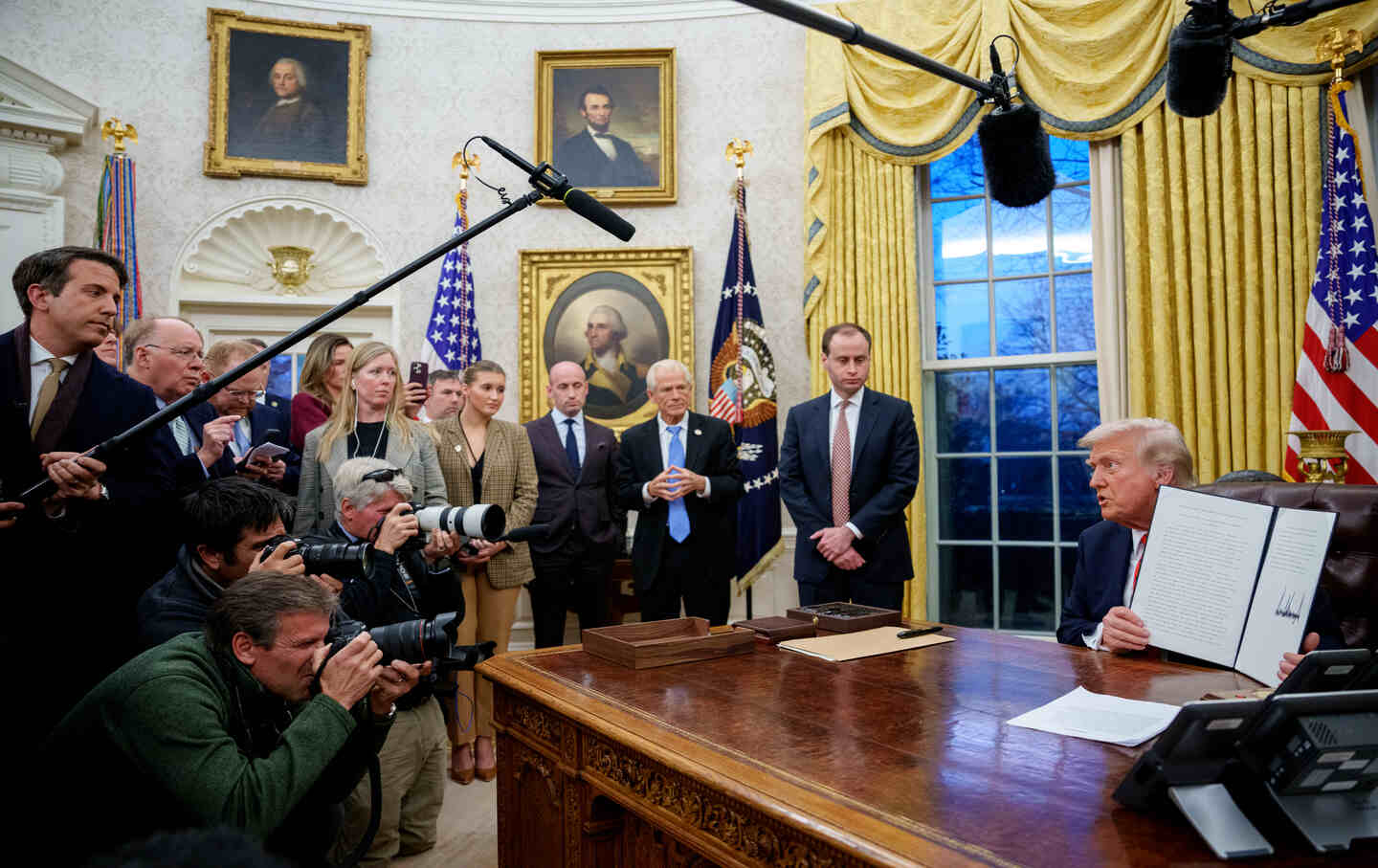
President Donald Trump signs a series of executive orders at the White House on February 10, 2025, in Washington, DC.
(Andrew Harnik / Getty Images)On this episode of Start Making Sense, we discuss the major legal battles Trump has lost in the last week, with federal courts ruling that key executive orders of his are unconstitutional. But what happens if Trump defies the courts? David Cole comments—he recently stepped down as national legal director of the ACLU to teach law at Georgetown University.
Also on this episode: “One of the most important lawsuits in the history of the United States” (The American Prospect): the suit brought by Public Citizen to stop Elon Musk’s attempted takeover of the Treasury Department’s payment system. Robert Weissman explains—he’s copresident of Public Citizen.
Subscribe to The Nation to support all of our podcasts: thenation.com/podcastsubscribe.

Here's where to find podcasts from The Nation. Political talk without the boring parts, featuring the writers, activists and artists who shape the news, from a progressive perspective.
As Trump’s support collapses, he has lashed out in two directions–sending an unprecendented number of ICE agents to Minneapolis, where one of them murdered Renee Good, and sending the military to Venezuela, where he says he has seized control of the oil industry. Harold Meyerson comments.
Also: Twenty Minutes Without Trump: There’s a new TV series about how capitalism came to Communist China, 30 episodes made for Chinese TV by the great Hong Kong director Wong Kar Wai, running now on the Criterion Channel. John Powers, critic-at-large on Fresh Air with Terry Gross, explains.
Advertising Inquiries: https://redcircle.com/brands
Privacy & Opt-Out: https://redcircle.com/privacy
Jon Wiener: From The Nation magazine, this is Start Making Sense. I’m Jon Wiener. Later in the show: the legal battles to enlist the courts in stopping Trump’s violations of the law and the constitution — and also Elon Musk’s — starting with what the American Prospect calls “One of the most important lawsuits in the history of the United States”: the suit filed by the nonprofit Public Citizen to stop Musk’s attempt takeover of the Treasury Department’s payment system.
Robert Weissman will explain– he’s co-president of Public Citizen.
But first: what if Trump defies the courts? what if the Supreme Court lets him? David Cole will comment – in a minute.
[BREAK]
We want to continue talking about the resistance to Trump today, and we want to focus today not on popular action, which was our focus last week. This week we want to talk about the courts. How much can the courts actually do to stop Trump? How much will they do?
For comment, we turn to David Cole. He recently stepped down as national legal director of the ACLU to return to teaching law at Georgetown. He’s the author of the book Engines of Liberty and he writes for The New York Times, The Washington Post, and The New York Review, and he’s legal affairs correspondent for The Nation. David, welcome back.
David Cole: Thanks for having me, Jon.
JW: Please remind us how Trump has been doing in the courts for the last couple of weeks when he’s been challenged by state attorneys general, by unions, and by nonprofit groups like Democracy Forward, Public Citizen, and of course the ACLU.
DC: Well, basically he has lost virtually every case that has come to a decision thus far. He has lost, with one exception, a case about whether the Musk DOGE could get access to certain labor records, but everything else, courts have enjoined his freezing of funds, enjoined his efforts to shut down USAID, enjoined his efforts to buy off government officials by paying them till September to do nothing, enjoined his orders on barring transgender women from being put in women’s prisons for their safety, enjoined his effort to overturn birthright citizenship.
Basically, the courts are doing their job and civil society is doing its job in challenging the executive orders where they are illegal. There are several that have been challenged and have not yet reached a result, but I think also will be very likely enjoined by the courts.
JW: And remind us how this compares with Trump in the courts in his first term.
DC: In his first term, he had the worst won-loss record of any president since FDR, and the early FDR term, when the Supreme Court was extremely conservative and overturning any law that protected consumers or workers from big business, and FDR was obviously pushing a lot of that in the New Deal. But since then, no president has fared worse than President Trump, although I think given what he’s done thus far in the last three weeks and given what’s happened in the courts, I think he’s out to eclipse his own record and have the worst record and the second worst record in the court in modern history.
JW: Well, of course we have a big worry right now. What if the courts continue to rule against Trump, seems likely, and he defies them? Tuesday of this week, The New York Times ran a five-column headline in their print edition after a federal judge on Monday said the White House had defied his order to release billions of dollars in federal grants to the states.
This was the first time a judge has expressly declared that Trump was disobeying a judicial mandate. This was a case where the court agreed with the attorneys general of 22 states that the Trump administration had to give the states money that had been allocated by Congress for Medicaid, school lunches, low-income housing subsidies, and other essential services. What’s your analysis of the judge’s action in this case at this point?
DC: I think people are making a lot more of it than it warrants. Essentially what the judge did was issue an order about stopping the freezing of certain funds based on one executive order and the government came in and said, “Well, we had other executive orders that weren’t at issue in this case that you didn’t enjoin. And so we had an alternative legal basis to cut off funding in these various contexts.” And the court said, “No, you’re wrong. The scope of my order was broader than that. It encompassed what you are saying.” That’s like routine litigation dispute in the wake of an initial order. ‘‘One side says it didn’t require us to do something, the other side said it did.
But what is clear is that there was no argument made by the Trump administration lawyers, we understand that you barred us from doing this, but you can’t and we’re going to defy your order. No, they said, “We think there’s an alternative legal basis that justifies what we’re doing.” They made traditional legal arguments, and the court rejected those traditional legal arguments. So we have not come to the point, anywhere close to the point of defying court orders. I think the more serious question really is where will the Supreme Court be, and how many of these orders will the Supreme Court actually enjoin? Because it’s a court that is quite conservative and quite protective of presidential power.
JW: We’ll get to the Supreme Court in a minute. First, I want to stick with what’s happening this week—and point out that even The New York Times, which gave this event such huge play, said that what the judge issued was, “essentially a nudge,” which was considerably less than a finding that Trump was in contempt of court or ordering penalties for failing to comply.
And shortly after Monday’s ruling, the Trump administration appealed to the First Circuit Court of Appeals. The White House spokesman said, “Each executive order will hold up in court because every action of the Trump-Vance administration is completely lawful.” The New York Times called that defiance. Is that what you would call it?
DC: No. First of all, I think that’s false, that everything they have done is lawful. But they have the right, as does any defendant, to appeal, and there’s an appeal to the Court of Appeals and then there’s an appeal to the US Supreme Court, and they will take those, and they are taking those. And Biden took those when his decisions were deemed unlawful. Obama took those when his decisions were deemed unlawful. That’s just ordinary business in the courts of the United States.
JW: And White House spokesmen saying what Trump did will be found to be completely lawful, how unusual is that?
DC: Yeah, I think you could go back through 200 years of history, and you would not find a White House press spokesperson who said, ‘Well, actually what the president did was illegal.’ It just doesn’t happen.
JW: Okay. So the Supreme Court, that’s our big worry, that they might support Trump. But maybe not. First of all, the Supreme Court doesn’t take very many cases, and in the past, they have let some anti-Trump decisions at appellate court stand without Supreme Court review. And Trump has actually lost some big cases at the Supreme Court too.
DC: Yeah, I mean, last time around I was at the ACLU. I started at the ACLU nine days before Trump took office. We filed over 400 legal actions against the Trump administration. He lost a lot of those, and some really big ones. The effort to put a citizenship question on the census, to depress responses from immigrant communities, the effort to not report on non-citizens in the census, even though you’re supposed to report on all people who respond to the census, the effort to terminate DACA relief for the DREAMers, all enjoined by the United States Supreme Court. And he followed those rulings. I’m sure he was not happy with those rulings, but he followed those rulings.
JW: People of course say, yeah, the Supreme Court ruled against Trump four or five, six years ago, but the court has changed since then. And of course, that’s true, but even this court has not done everything Trump wanted. And Chief Justice John Roberts in his year-end report in December kind of anticipated what is happening now after JD Vance made this statement that Trump should defy the Supreme Court if it ruled against him. Roberts said in his year-end report, “These dangerous suggestions must be soundly rejected.” Let’s talk about that for a minute.
DC: Look, for 200 plus years, the court has issued decisions against presidents. Since Marbury versus Madison, one of the earliest Supreme Court decisions, it has been established that the Supreme Court has the final say on the legality of actions by the president or by Congress and they have to follow his decisions.
JW: Marbury versus Madison, 1803.
DC: Every president has lost before the Supreme Court. No president has defied the Supreme Court. The most anyone can point to is Andrew Jackson, who with respect to a particular decision said, “Well, Chief Justice Marshall can issue that opinion, but who’s going to enforce it?” Or something like that. But in fact, there was no order to defy in that case and Andrew Jackson did not defy any order of the court and nor has any other president since then.
I think this is as close to a sacred principle in our constitutional democracy as anything else because the rule of law is predicated on the notion that the courts have the final say on law and that the political branches have to follow them when they lose. And again, every president from Nixon on down and Trump have previously followed this. So I just don’t see that as the realistic threat.
I think the real threat here is more that the Supreme Court will favor President Trump, some of President Trump’s actions, which are unlawful, and they’ll conclude they’re lawful. I don’t know that that will happen, but I think that’s a much more realistic concern than the concern that Trump will lose and defy the court.
But were he to defy the court, that would be a political firestorm like we have not seen. And one sort of illustration of that is look what happened in Israel when Netanyahu challenged the independence of courts there with various efforts, he wanted to enact to try to undermine the independence of the courts. Hundreds of thousands of people came out into the streets to protest.
JW: And they didn’t come out just once. They came out for months, hundreds of thousands of people for months, and they only stopped when the Gaza war began.
DC: This is about as basic a principle to a constitutional democracy as there is, and I just don’t see the president violating it. And if he does, I think he’ll be the one that pays for it, not us. President Trump is a norm breaker. There’s no question about that. Some of the things he’s done already are truly outrageous. And so I think a lot of people are letting their fears take them to the worst place, but I don’t think it actually serves much purpose. And I think it’s also very unlikely that it will happen. And I think if it happens, hey, we should be out in the streets at that point.
JW: The New York Times suggested that the Supreme Court could issue what they called an early splashy ruling against Trump to send a signal about their own power and independence, and they suggested that upholding birthright citizenship, which the Trump administration says is unconstitutional, would be a good candidate and that they might actually do that. What do you think about that?
DC: Well, I have very little doubt that they will strike down his effort to undermine birthright citizenship. It’s there in the text of the Constitution, the 14th Amendment. The court has already ruled on it and said that it is a constitutional guarantee for all people who are born here and subject to the jurisdiction thereof, and that subject to the jurisdiction thereof they’ve read very, very narrowly to apply to people like diplomats who are actually not subject to our laws, but everybody else is subject to our laws. So I think they will rule against the president on that when it eventually gets there.
The initial sort of contretemps in the Supreme Court are going to be on stay requests. They are going to be situations where the lower courts have enjoined the president and his lawyers seek a stay on the emergency shadow docket. And those typically, they don’t have argument. They typically result in decisions that have very little reasoning. So they may not be all that dramatic, but they will be the first indications of whether this is a court that is going to seek to hold the president accountable to the rule of law.
But I think they will. I think, and it is true the court has, he appointed a number of people to the court, but that court ruled against him on the subpoena cases where he sought to challenge both a New York prosecutor and Congress’s efforts to subpoena his tax records, and his own appointed justices ruled against him in those cases. So I think it’s just too cynical to think, oh, they’re just going to whitewash whatever he does, they’re on Trump’s team. That’s just not how it works.
JW: His own appointed justices voted against him in the subpoena cases last term. Of course, what our friends who worry the most about this say is they point to the Supreme Court’s ruling granting him immunity from criminal prosecution. If Trump is immune from criminal prosecution, they say, doesn’t that mean he can do anything he wants, and no court can stop him?
DC: So no, it doesn’t mean that. The criminal prosecution case was, I think an abomination. There was no basis in the text or the history of the Constitution for the immunity that they granted to the President. And I think it’s a very, very bad decision. But they made very clear there are all sorts of other checks in place. We’ve had 200 years plus of presidents. None of them have been prosecuted for criminal activity. The vast majority of them have not even been alleged to have engaged in any criminal activity, with the exception of Nixon and Trump himself.
And I don’t think that’s because they were afraid of getting prosecuted after they left office. I think that’s because there are a whole host of checks in the system that ensure that presidents don’t engage in blatantly criminal conduct. And those checks include the ability to sue the president, the fact that the Supreme Court has clearly established power to order the president to stop doing what he’s doing, Congress’s power to cut off funding to anything that it disagrees with or to refuse to pass a budget bill if they’re unhappy with what the president has done, Congress’s ability to subpoena the president and call his folks to testify before Congress, and ultimately impeachment.
And of course when Congress is controlled by the Republican Party, those latter congressional checks are unlikely to play that much of a role, if any, but there are still a host of checks in place that I think explain why we have not seen rampant criminal conduct by presidents. And I don’t think we will going forward, with the possible exception of President Trump, who has already shown himself capable of engaging in criminal conduct, even when he thought and his attorneys argued that he could be prosecuted after the fact. He made that argument in the second impeachment trial. He said, “Don’t impeach me because I can be tried after the fact.”
And then when he got off of the impeachment, he then turned around and said, “Oh no, I can’t be tried after the fact.” So Trump is thankfully a unique case in our history and we’re going to have to deal with that unique case. But there are a lot of checks in place.
JW: Elie Mystal at The Nation, who I understand you debated last week at the New York Historical Society on these very questions, he writes in his column at The Nation that “the courts won’t save us.: But I don’t think you think the courts alone will save us. In fact, I think you’ve written a book about the power of citizen activists. Maybe you should remind us about that.
DC: Yeah, so I would say that Elie and I had a conversation at the New York Historical. Sometimes at some points it might be considered to be a debate. So look, we disagree. Elie is much more skeptical about the courts, I think too cynical about the courts, and that’s based on my experience of repeatedly suing President Trump and winning and reuniting thousands of families separated by the President, for example, in his family separation policy, because we sued in court and won. So I’ve seen the evidence, and I think it’s there.
But I do not believe that we can just sit back and rely on the courts to save us. I agree with Elie there. The courts work when the American people are standing up for their rights, advocating, joining together, and standing up for the values that they believe in. If we all sit back and wait for the courts to save us, they won’t. But if we step forward, if we act, if we join in organizations that are committed to upholding the rule of law and the basic principles of our constitutional democracy, that is how the Constitution is made meaningful, through that kind of civil society action.
And often I point to the fact that you look around the world and virtually every country has a constitution and they all look pretty good on paper. Many of them look better on paper than ours, but many of them have very little actual application in terms of checking their leaders. And what’s the difference? The difference is really twofold. One, the absence of a robust civil society, the kinds of nonprofits and media, and the academy, all the non-governmental institutions that are very strong in this country, and the sacrosanct principle of an independent judiciary.
Those two things together are very, very powerful. And I think it is not in our interest to suggest that they’re not because there isn’t anything else. I don’t know what Elie suggests we do if we’re not supposed to be engaging in civil society activism and going to the courts and challenging, particularly when Congress is controlled by the Republicans.
JW: And I would add just one last thing. Trump is not popular, and what he is doing is not popular. All incoming presidents have the famous honeymoon period, but Trump already has the highest disapproval rating of any president at this point in their presidency. The Pew opinion poll last week asked, “Does Trump respect the country’s democratic values?” 31% said yes. 53% said no. They asked, “Does Trump act ethically in office?” 29% said yes. 54% said no. So we are not alone. We represent the majority.
DC: Absolutely. And really what will undermine us is despair, cynicism and despair. If we stand up, if we fight back, we have the tools available to push back and to defend our values. And that’s the only real choice we have because it’s not a choice to sit back and just let it happen.
So again – we pushed back the last time. It made a big difference. A lot of people’s rights were protected. A lot of harm was not done. The midterms were a disaster for Trump, and he didn’t have a majority in the House in his last two years, so he couldn’t do anything in Congress. Even when he had majorities in the House, he wasn’t able to do what he wanted to do. He tried to repeal Obamacare about 14 times, and every time he failed. Why? Because the people were against it. This is a country in which thankfully we have a lot of tools for the people to exercise, to speak out against and fight back against abuse, and we need to use them, not demean them, and diminish them.
JW: David Cole wrote about Trump and the courts for The New York Review Online. You can read his piece, it’s titled “The Unhinged Presidency,” at nybooks.com. Thank you, David. This was great.
DC: Thanks, Jon.
[BREAK]
Jon Wiener: Now we want to talk about the legal battles to enlist the courts in stopping Trump’s violations of the law and the Constitution, and also Elon Musk’s. Let’s start with what The American Prospect calls “one of the most important lawsuits in the history of the United States.” That’s the suit filed by the nonprofit Public Citizen to stop Elon Musk’s attempt to take over the Treasury Department’s payment system, basically the bank account of the United States government. It’s a lawsuit that won a temporary restraining order from a federal judge in Washington, D.C. Here to talk about that effort, and others like it, is Robert Weissman. He’s co-president of Public Citizen and appears often on the major news networks. Rob Weissman, welcome to the program.
Robert Weissman: Great to be with you.
JW: The big picture here: a lot of us were surprised that Elon Musk’s first target was the Treasury Department payment system. Why is that so important to him – and to us?
RW: There’s an evil genius to what Musk and his acolytes are doing. They don’t really understand policy at all. They don’t understand or care about the law, but they do understand technology and organizational choke points. What they recognized was, if they went after the Treasury payment system — this is how the government pays everyone, contractors, employees, returns your tax money to you if you’re owed a refund, social security recipients — they could control a great deal of what the government does, and impede what the government properly does. So they’ve tried to gain access to this data system, and we’ve got a temporary restraining order in place that very much restricts what they’re able to do right now.
JW: The argument that won was that Musk had violated the Privacy Act. I have to say that’s not the first thing that comes to mind when people think about the problems posed by Elon Musk. What is the problem there?
RW: One of the things we have to do in these lawsuits is not just complain that something is morally wrong, but come up with a legal claim for it. So the Privacy Act gives some significant protection to an individual’s private information and their private data and doesn’t permit the government to disclose it to people who shouldn’t see it, and that’s essentially what our case is about.
You’re correct that what’s at stake is, although that is serious, is much bigger, which is the ability of Musk and his DOGE operation to really turn off the spigot on federal spending decisions. There are other issues too about whether, which relate to the privacy claim, about whether he is able to access information about competitors, whether he’s able to improperly take information and use it for his business interests. Those are things that may get caught up in some of these Privacy Act claims or may not. There’s a lot swirling here, but the core of our claim and ability to stop this, at least for now, has been the Privacy Act violation.
JW: And in order to win a temporary restraining order, you need not only a good law, which turns out to have been the Privacy Act, you need to find a good plaintiff, a plaintiff who has standing, who has actually been harmed. You succeeded. Tell us about your plaintiffs here and why they were the right plaintiffs in this case.
RW: We’re representing government workers who have an interest as employees in having their information protected. For folks who are outside of Washington, D.C., and maybe other people are feeling it, since Trump was inaugurated and he and Musk started ransacking the government, there’s been a level of fear in the federal workforce, and to some extent around the country, that has no recent parallels, maybe no parallels since the McCarthy period.
People are really, really scared. It is qualitatively different than what it was in the first Trump administration and it’s really underscoring the essential role of labor unions to protect people’s collective interests so that individuals don’t have to go out on their own and put themselves at risk. And we’re seeing time and time again, it’s employee unions and other unions that are serving as plaintiffs in these cases to overcome the individual fear through collective action and collective self-protection.
JW: And specifically, you’re representing The American Federation of Government Employees and the Service Employees International Union.
There’s a second lawsuit that has also succeeded in getting a different judge to block Musk’s takeover for the Treasury payment system. This one was filed by State Attorneys General of 19 states led by New York, including California and Minnesota, lots of others. It argued that the states would suffer irreparable harm from Musk’s takeover and the temporary restraining order in that case ordered Musk and his team to “immediately destroy any and all copies of material downloaded from the Treasury Department’s records and systems, if any.”
How is the Attorneys General suit in this case different from yours?
RW: I think it’s really quite similar. One thing that’s happened over the years is the US Supreme Court has changed who’s able to bring a lawsuit, who has so-called standing, who is able to show that they’ve been injured. The courts have narrowed and narrowed that, but states often are the best plaintiffs to say they are impacted negatively by one or another federal policy. So it’s really a positive development that the states are in, and we now have another judge who’s also imposed restrictions on what Musk and his team were able to do at the Treasury Department.
JW: Over the weekend, vice president JD Vance declared in response to the temporary restraining orders in your case and the Attorneys General’s case that courts and judges are not allowed “to control the executive’s legitimate power.” I wonder if you have any comment on the vice president.
RW: I have many comments on the vice president, and some on the vice president’s comment.
JW: Okay!
RW: It is astounding and outrageous. JD Vance went to law school. He knows how the law works. He knows what these cases are about. The cases are precisely about whether what is going on is within the legitimate authority of the president and the executive branch.
JW: Yes.
RW: Of course courts aren’t going to interfere with the legitimate exercise of presidential power. What they should do, what they have been doing and hopefully will do, is block the illegal use of force, the improper use of non-legitimate executive branch authority.
Quite troubling comment from JD Vance, who knows better and who is, in the best case, trying to intimidate courts to back down and defer to the executive as part of this theory that some of the legal extremist right have that the president should have almost unfettered authority over Congress or over the judiciary. By the way, not a theory they tend to adopt when there’s a Democrat who’s the president.
JW: Interesting. Public Citizen had another big legal victory when a different federal judge temporarily blocked Musk’s plans to put 2,200 employees of USAID on paid leave and recall nearly all of the agency workers abroad. USAID, of course, the foreign policy expenditures of the United States. He also temporarily reinstated 500 workers already put on leave. Tell us about that case.
RW: This is an instance of Musk and Trump trying to shut down an agency, the U.S. Agency for International Development, which is for sure a flawed agency but is the primary humanitarian instrument of the US government and funds and supports and directly enables hugely important humanitarian efforts around the world, everything from providing food to desperately hungry people, providing medical care to people who otherwise wouldn’t get it, assisting women and girls who’ve been sex trafficked, advancing development and environmental protection in poor countries, and on and on. They have decided they want to shut down that agency, the U.S. Agency for International Development.
Fortunately for us, unfortunately for them, that is a congressionally created agency that’s congressionally appropriated and the president can’t just decide, “I want to shut it down,” or, “I don’t want to spend the money that Congress has appropriated.” That’s what this case is about. It’s not really a close call. It is as unconstitutional and illegal as it could get. The administration is trying to argue, ‘Well, this is just a personnel action. We’ve got the ability to say someone shouldn’t work for us or to eliminate a few jobs here or there,’ but they are in fact trying to eliminate the agency overall. They’ve been very explicit about it, even chiseling the name of the agency off its building here in Washington, D.C.
JW: And I’d like to ask about some of the other legal challenges to Trump executive orders. On deporting undocumented residents, several sanctuary cities led by Chicago, including San Francisco and Portland, are suing the Trump administration in response to efforts to punish them for refusing to help ICE deport undocumented people.
Last week, Trump’s new Attorney General Pam Bondi directed the Justice Department to withhold grant funding from cities and counties that do not assist ICE. The specific issue here is ICE wants to be notified when undocumented people are scheduled to be released from jail after serving their sentences so they can pick them up and take them into federal custody. The sanctuary cities and counties argue that the federal government can’t compel local jurisdictions to keep people in jail after they have served their sentences, and they can’t require that cities and counties enforce federal policies; federal laws are enforced by federal agencies.
What is the law on this one?
RW: I think it’s going to be a mix of things. It’s going to be exactly what you described in the states and cities and counties arguing, ‘We are autonomous and it’s not, under our federal system, it’s not our job to enforce federal law.’ The Trump administration is going to argue, ‘Well, the national government, the federal government has authority over issues related to immigration and protecting our borders,’ so-called, ‘and everybody has to be on board with that mission.’ And then the intersection of this is going to be can the federal government withhold money from states and counties in areas unrelated or potentially unrelated to immigration policy because of a state or county’s refusal to go along with these draconian demands from the federal government?
I think the states and counties and localities have a very strong argument. The worry is courts tend to be deferential to the federal government when it comes to claims around immigration. So it’s going to really depend on how they look at this. Is it a matter of state authority and traditional autonomy for states and their legitimate interests, or do courts just defer to whatever the federal government says when it comes to immigration?
JW: A key issue is Trump’s executive order ending birthright citizenship for children born in the United States with undocumented parents. That has been challenged by two groups of state attorney generals. In both cases, the judges issued preliminary injunctions halting enforcement of the president’s order. The new White House Press Secretary Karoline Leavitt said in her very first press conference, “This administration believes that birthright citizenship is unconstitutional.” I wonder if you have any comment on that.
RW: Birthright citizenship is not only constitutional, it’s constitutionally compelled. There’s no serious lawyer who thinks otherwise, no one who bothers to read the 14th Amendment who thinks otherwise. And I doubt that they really think otherwise. Almost for sure they’re going to lose this case. I think this one goes too far, even for conservative courts and even for a very Trump-friendly Supreme Court.
It’s really important for folks to understand what’s at stake. I mean, it’s not just, as important as it is, the rights of children born in the United States to non-citizen parents, so immigrant kids’ parents. It really speaks to what the United States is as a nation and as a country. It’s a profoundly democratic issue. We don’t define citizenship in this country by blood, ethnicity, who your parents were. If you’re born in this country, you’re a citizen, full stop. And that is a profoundly and proudly democratic principle that the authoritarian and racist and xenophobic Trump regime hopes to erase. And I think they’re going to lose and it’s very, very important that they do. We should be embracing and celebrating this principle. No one should be defensive about it. It’s one of the things that distinguishes America in a really good way, and we have to hold onto it and I think we’re going to.
JW: So we’ve been talking here about the last week. What do you have coming up this week and afterwards?
RW: One case that will be argued on Monday for a TRO has to do with the administration stripping information from the websites of the Centers for Disease Control and other agencies and the Department of Health and Human Services related to their obsession with so-called gender ideology. They have taken down from the website important scientific information used by researchers and also by clinicians, any website or dataset that mentions some prohibited words, including the word gender. I’m not sure if it’s still the case, but at one point, they had taken down, for example, a dataset on heart disease in Florida by county, by gender because it included the word gender. But there are hundreds of different sites and datasets down that are really imperiling the ability of doctors to do their job as well as researchers to do their work.
So we’ll be arguing for a TRO to get that information back up on the internet and made available to the public and to doctors and scientists. That’s going on across the government with a wide purge of information, because it transgresses no-go words from the administration that’s supposedly obsessed with free speech and anti-censorship. We’ve really never seen a more far-reaching, and stupider, example of the harms of censorship, at least not in any recent times.
JW: Robert Weissman is co-president of Public Citizen. You can find out more about their work at www.citizen.org. Rob, thanks for all your work – and thanks for talking with us today.
RW: Great to be with you. Thanks.

